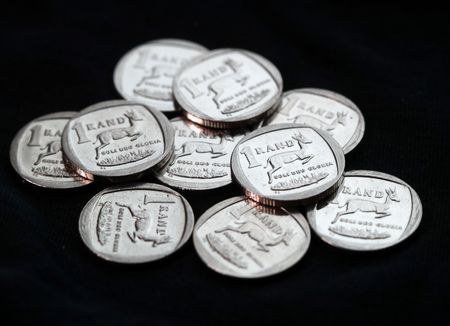By Shariq Khan
NEW YORK (Reuters) -Oil prices rose for the second consecutive session on Tuesday, as traders downplayed hopes of a Middle East ceasefire and focused on a tightening global supply and demand balance.
Brent crude futures for December settlement were up $1.61, or 2.2%, to $75.90 per barrel at 2:10 p.m. ET (1810 GMT). U.S. West Texas Intermediate futures for November delivery, which expire after Tuesday’s settlement, were up $1.54, or 2.2%, at $72.10 a barrel.
U.S. Secretary of State Antony Blinken met Israeli Prime Minister Benjamin Netanyahu in the first big push for a Middle East ceasefire since Israel killed the leader of Hamas last week. Washington hopes this will provide an opportunity for peace.
Oil traders were not convinced this push will be much different from Blinken’s previous 11 visits to the region since the war in Gaza erupted last year, said Bob Yawger, director of energy futures at Mizuho.
Israel has so far shown no sign of relenting in its Gaza and Lebanon campaigns, while Iran-allied Hezbollah ruled out negotiations while fighting with Israel continues.
Oil traders are also weighing implications for fuel demand from China’s stimulus measures and a tightening global supply-demand balance, said Alex Hodes, energy analyst at brokerage StoneX.
Both Brent and WTI rose nearly 2% on Monday, recouping some of last week’s more than 7% decline, following Beijing’s cut to benchmark lending rates in an effort to revive China’s slowing economy.
The move signals willingness from the world’s top oil importer to support demand, Hodes said. Still, he cautioned that stimulus measures may not provide a major near-term boost.
“We have perhaps seen the low point in demand, but I do not know if there is much consensus regarding how much it can improve the situation.”
China’s oil demand growth is expected to remain weak in 2025 as the world’s No. 2 economy electrifies its car fleet and grows at a slower pace, the head of the International Energy Agency said on Monday.
Still, Saudi Aramco is fairly bullish on China’s oil demand especially in light of the stimulus package, the head of the Saudi oil giant said on Monday.
Despite doubts over China demand, global oil inventories point to a supply deficit in the fourth quarter, which should support prices, Hodes said.
Global petroleum stocks were at around 1.24 billion barrels as of last week, 5 million barrels lower than last year, according to StoneX’s review of data from major trading hubs.
U.S. crude oil stockpiles likely rose by around 100,000 barrels last week, while distillate and gasoline stocks fell by more than 1.5 million barrels each, a preliminary Reuters poll showed. Crude stocks had dropped by 2.2 million barrels in the week ended Oct. 11.
(Reporting by Shariq Khan, Ron Bousso, Yuka Obayashi and Siyi Liu; Editing by Mark Potter, Barbara Lewis, Chris Reese and David Gregorio)











